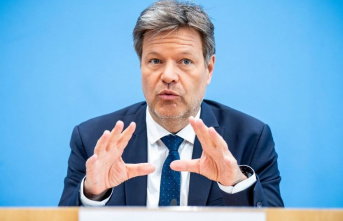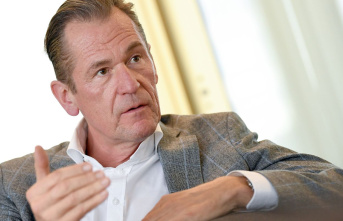A statement by Federal Minister of Economics Robert Habeck (Greens) on the question of a possible wave of insolvencies has caused sharp criticism in the ranks of the opposition. "Unworldly, aloof, aimless. Economics Minister Habeck has no idea about economics, he stands for the economy," explained CSU General Secretary Martin Huber.
Union faction leader Friedrich Merz reproached Habeck with how helpless he was in questions of the crisis, one could see on television the night before. "One can only hope that the majority of German medium-sized entrepreneurs and above all the bakers were already in bed and asleep at this time and didn't have to see it," said the CDU leader in the general debate on the budget in the Bundestag.
Habeck: "Not bankrupt, but maybe stop selling"
In the ARD program "Maischberger" on Tuesday evening, when asked if he was expecting a wave of bankruptcies at the end of this winter, Habeck replied: "No, I'm not doing that. I can imagine that certain industries will simply stop producing for the time being ."
Habeck gave flower shops, health food shops and bakeries as an example because these shops "depend on people spending money". Such companies would then have real problems because there would be a reluctance to buy. "Then they are not automatically insolvent, but they may stop selling," said Habeck.
CSU politician Huber commented on Habeck's statement on Twitter: "And if too little electricity is produced in winter because the nuclear power plants need 1 week to start up, that's not a blackout but the light just stops shining a bit, or what? Habeck works into intellectual bankruptcy."
At the same time, Habeck emphasized that support programs for certain companies are being worked on. "In the case of Corona, politicians decided to assume all the costs. That was enormously expensive, and we have not yet made this political decision," said Habeck.
According to him, this support must be designed in such a way that the financial possibilities are used in a targeted manner and reach those affected.
Ministry counters criticism
The Federal Ministry of Economics countered the criticism. The minister just wanted to make clear "the important difference" between insolvencies and business closures, a spokeswoman said in a written statement on Wednesday. She explained that Habeck wanted to show that the risk of "silent business closures", i.e. business closures without filing for bankruptcy, is a problem for an economy and that the government must keep an eye on both.
"Looking at the bankruptcies alone" does not go far enough. "The insolvency procedure serves to preserve the company as much as possible in a structured procedure. On the other hand, operational closures mean that companies give up without filing for bankruptcy because, for example, they see that their business is simply no longer worthwhile due to high energy costs. Operational closure is not synonymous with of bankruptcy." The threat of operational closures due to the high energy costs are "a serious problem, especially for small and medium-sized companies," it said.












